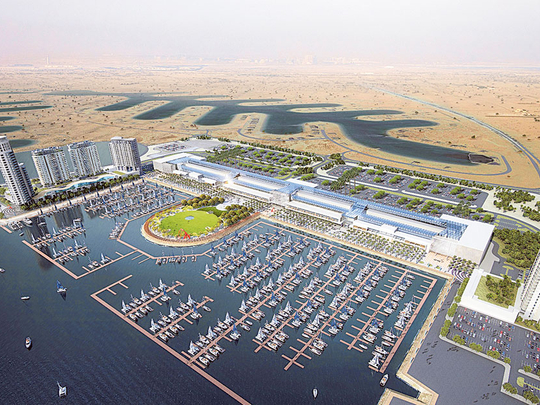
Kuwait City: The “mixed-use” concept is finally starting to get traction in Kuwait, with the Tamdeen Group unveiling the $700 million (Dh2.57 billion) Al Khiran project as the centrepiece of the Sabah Al Ahmad Sea City. Apart from featuring Kuwait’s first outlet mall concept (75,000 square metres), Al Khiran is to have two freehold residential towers (for Kuwaiti nationals), a serviced apartment building and an upscale hotel.
The development is scheduled for a late 2018 or early 2019 opening, with the funding needs to be met primarily through self-finance and sourcing from institutions. It will also incorporate an extensive marina component with berths for as many as 900 boats.
The concept of creating high-density residential and commercial real estate built around extensive retail, leisure and entertainment attractions has already been extensively used by master-developers in Dubai and Abu Dhabi. Apart from serving the resident base within the country, it also builds up exposure with overseas visitors.
With Al Khiran, the Kuwaiti developer has similar plans and is pitching itself as a future “conservative tourism hub”, which would pull free-spending visitors driving in from Saudi Arabia as well as from Iraq and Iran.
The Tamdeen Group historically had its strengths in the retail space, having developed the 360 Mall and Al Kout Mall, among others. More recently, it has started to expand its interests in creating hospitality-specific projects as well as residential interests.
Its project pipeline is valued at $2 billion. “Our GDP (gross domestic product) is over $200 billion, our inflation rates are low at around 2.5 per cent, we have 10 per cent of the world’s reserves ... our GDP growth stands at an average of 3.5 per cent,” said Mohammad Jassim Khalid Al Marzouq, Chairman of Tamdeen, on what it would mean to invest at a time when oil price patterns are still on the volatile side. “All signs augur will for tremendous growth over the next few years.”
And where there are gaps, steps are being taken to fill them. According to Al Marzouq, Kuwait remains grossly underserved in quality retail stock compared “what’s available in a neighbouring country”.
“The international [retail] industry has experienced the lack of gross leasable area, and the reason for that is the lack of masterplanning that is developed to cater to (changing) industry norms.”
He added that steps are being taken in conjunction with the government to address the lacunae. “With better cooperation among all those involved, and which includes the private sector, there is potential to realise major projects in the future,” said Al Marzouq, who is also a Board Member of the Kuwaiti Government’s Supreme Council for Planning and Development.
“This can be done within the existing laws that can be made more flexible.”











